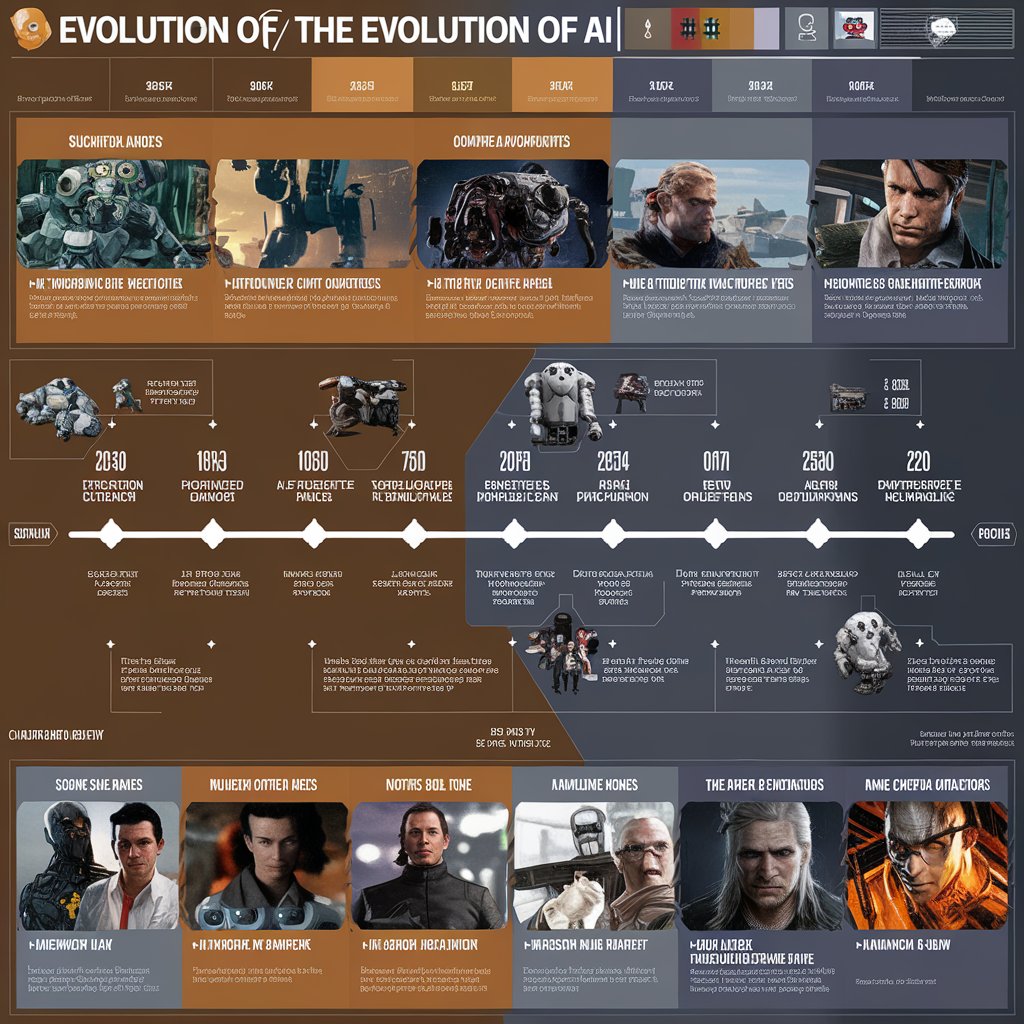The Evolution of AI in Gaming: From Simple Bots to Complex Narratives
Artificial Intelligence (AI) has drastically transformed the gaming industry over the years. From rudimentary algorithms that drove early game behavior to sophisticated systems that craft intricate narratives, the journey of AI in gaming is a fascinating one. Let’s dive into this evolution, explore its milestones, and speculate on what the future holds for AI in the gaming world.
Early Days of AI in Gaming
The Dawn of Gaming AI
The concept of AI in gaming began with very basic algorithms. Early video games utilized simple logic to control in-game behaviors. These algorithms were far from the intelligent systems we see today but were groundbreaking for their time.
Examples of Early AI Bots
Games like Space Invaders and Pac-Man showcased primitive forms of AI. In Space Invaders, the movement of enemies was programmed in a repetitive pattern, creating a basic yet engaging challenge for players. Similarly, Pac-Man featured ghosts with simple AI that followed pre-set paths or pursued the player, adding a layer of complexity to the game.
Advancements in AI Technology
The Shift to More Complex AI
As technology advanced, so did AI in gaming. The introduction of decision trees allowed games to offer more varied and dynamic interactions. These decision trees enabled NPCs (non-playable characters) to make choices based on the player’s actions, creating a more immersive experience.
Notable Milestones in AI Development
The development of chess engines marked a significant milestone in AI. Programs like IBM’s Deep Blue, which famously defeated world champion Garry Kasparov, showcased the potential of AI in strategic thinking. Additionally, game theory, which explores optimal decision-making strategies, began to influence game design, leading to more sophisticated AI behaviors.
The Role of AI in Modern Gaming
AI in Game Design and Development
In modern games, AI plays a crucial role in game design. Procedural generation, powered by AI, allows developers to create vast, diverse game worlds without manually designing each element. This technique has been widely used in games like Minecraft and No Man’s Sky.
Dynamic difficulty adjustment is another AI-driven feature that enhances player engagement by tailoring game difficulty based on individual performance. This ensures that players are consistently challenged without becoming frustrated.
Enhancing Player Experience with AI
AI also enriches the player experience through advanced NPC behaviors and interactions. Modern games feature NPCs with complex routines and responses, making the game world feel more alive. Personalized gaming experiences are also possible thanks to AI, which can analyze player behavior and tailor content accordingly.
Case Studies: AI in Popular Games
The Impact of AI in RPGs
Role-Playing Games (RPGs) like The Elder Scrolls series and Cyberpunk 2077 demonstrate how AI can create dynamic and immersive narratives. In these games, AI-driven NPCs interact with players in meaningful ways, contributing to a richer storytelling experience.
AI in Strategy Games
Strategy games such as Age of Empires and StarCraft II use AI to control enemy factions, create challenging opponents, and simulate complex strategic scenarios. These AI systems must balance difficulty and provide a fair challenge, showcasing the depth of modern gaming AI.
The Future of AI in Gaming
Emerging Technologies and Trends
Looking ahead, AI is set to become even more integral to gaming. Machine learning algorithms will enable games to learn from player behaviors and adapt in real-time. Integration with Virtual Reality (VR) promises even more immersive experiences, with AI helping to create responsive and interactive virtual environments.
Predictions for AI in Gaming
The future may bring fully autonomous NPCs with advanced decision-making abilities, making game worlds more dynamic and unpredictable. Enhanced narrative techniques driven by AI could lead to highly personalized and engaging storytelling experiences.
Ethical Considerations and Challenges
AI and Game Balance
While AI has brought many benefits to gaming, it also presents challenges. Maintaining game balance is crucial, as overly powerful AI can detract from the enjoyment of the game. Developers must ensure that AI enhances rather than detracts from the player experience.
Privacy Concerns and Data Collection
With AI’s ability to analyze player data, privacy concerns have arisen. Ensuring that data is handled responsibly and transparently is essential to maintaining player trust and safety.
Conclusion
The evolution of AI in gaming has been nothing short of remarkable. From its humble beginnings with simple bots to its current role in crafting complex narratives, AI has significantly impacted the gaming industry. As we look to the future, the potential for AI to further enhance gaming experiences is exciting and full of possibilities.
FAQs
- How has AI evolved in gaming over the years?
AI has evolved from simple algorithms to complex systems capable of creating dynamic interactions, personalized experiences, and advanced narratives. - What are some examples of early AI in video games?
Early examples include Space Invaders and Pac-Man, where AI controlled enemy movements and behaviors in basic yet engaging ways. - How does AI enhance the player experience in modern games?
AI enhances the player experience by creating realistic NPC behaviors, personalizing game content, and enabling dynamic difficulty adjustments. - What future advancements can we expect from AI in gaming?
Future advancements may include fully autonomous NPCs, more immersive VR experiences, and AI-driven personalized storytelling. - What ethical issues are associated with AI in games?
Ethical issues include maintaining game balance and addressing privacy concerns related to data collection and player information.
